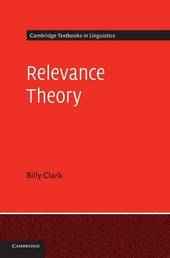
|
Relevance Theory
Hardback
Main Details
| Title |
Relevance Theory
|
| Authors and Contributors |
By (author) Billy Clark
|
| Series | Cambridge Textbooks in Linguistics |
|---|
| Physical Properties |
| Format:Hardback | | Pages:420 | | Dimensions(mm): Height 252,Width 178 |
|
| ISBN/Barcode |
9780521878203
|
| Classifications | Dewey:401.4 |
|---|
| Audience | | Tertiary Education (US: College) | |
|---|
| Illustrations |
Worked examples or Exercises; 3 Tables, black and white; 21 Line drawings, unspecified
|
|
Publishing Details |
| Publisher |
Cambridge University Press
|
| Imprint |
Cambridge University Press
|
| Publication Date |
11 July 2013 |
| Publication Country |
United Kingdom
|
Description
Over the past twenty years, relevance theory has become a key area of study within semantics and pragmatics. In this comprehensive new textbook, Billy Clark introduces the key elements of the theory and how they interconnect. The book is divided into two parts - the first providing an overview of the essential machinery of the theory, and the second exploring how the original theory has been extended, applied and critically discussed. Clark offers a systematic framework for understanding the theory from the basics up, building a complete picture and providing the basis for advanced research across a range of topics. With this book, students will understand the fundamentals of relevance theory, its origins in the work of Grice, the relationship it has to other approaches, and its place within recent developments and debates.
Author Biography
Billy Clark is a senior lecturer in English Language in the Department of Media at Middlesex University. He has considerable experience teaching relevance theory at undergraduate and postgraduate level and was editor of the 'Foundations of Linguistics' section for the Encyclopedia of Language and Linguistics edited by Keith Brown.
Reviews'A beautifully clear, insightful and entertaining overview of relevance theory, which takes readers from first principles to recent developments in a warm, witty and fair-minded way. I would recommend it to anyone with an interest in how communication works.' Deirdre Wilson, University College London
|